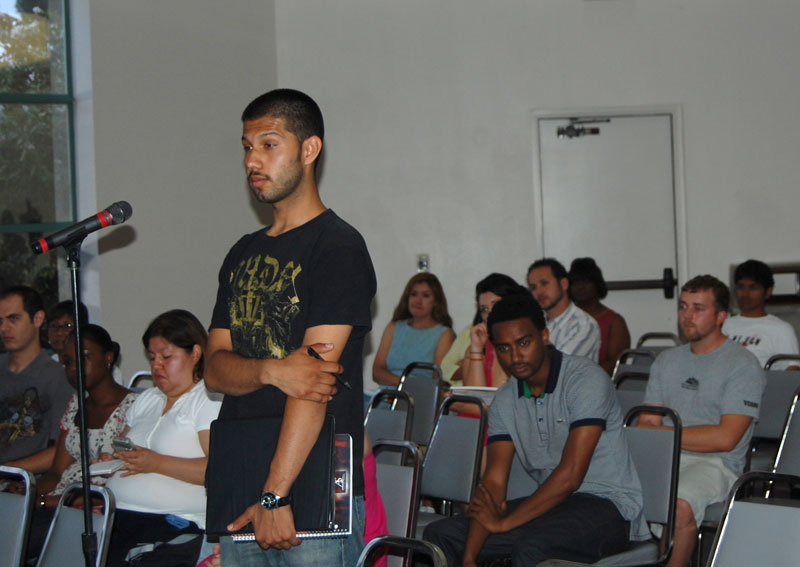
University presidents told students that a lack of involvement on their part may perpetuate the California State University (CSU) crisis at The Presidents’ Town Hall Meeting on Friday.
The event, which took place at the University Student Union’s (USU) Thousand Oaks Room, was the second opportunity for students to meet with CSUN”s presidents to ask questions and express their concerns.
The panel included University President Jolene Koester, Associated Students (A.S.) President Abel Pacheco, Faculty President Jennifer Matos and CSU Student Trustee Russel Statham.
“We are all working hard,” said Pacheco, who was referring to the panelists. “But again, I can say it a million times and shout it at the top of my lungs from the top of Sierra Hall, it doesn’t matter if students are not going to these town hall meetings and talking to senators and people who vote and make these decisions, they are not going to care. It’s that simple.”
The presidents’ frustration was shared by students who didn’t receive concrete answers to their questions.
International student Daehyan Kim, who hasn’t been able to get into classes and doesn’t have the 12 units required for his student visa, wanted to know how the university would help him in case immigration deports him.
“I feel like everyone knows the problem, but no one knows the answer,” Kim said.
Koester said she had nothing to do with U.S. immigration and didn’t know what would happen to him, and instructed him to speak to someone at the International & Exchange Student Center again.
But Kim was not the only student who voiced his concern about not being able to get into the classes he needs.
Junior Jose Perez, an educational psychology and counseling major, who is a transfer student from Los Angeles Valley College, said this was his first semester at CSUN and he had chosen the wrong time to transfer because he hasn’t been able to get into the required classes he needs to graduate.
Matos defended professors and said it was not their fault because they had been given strict orders not to add students.
“It is across the university that it’s happening,” Matos said. “It’s not her fault (Koester), it’s not my fault, it’s because of the budget crisis.”
Biniyam Fissehaye, a Pan African studies major, said he kept on hearing about students not being active and that it sounded as if they were being blamed for the situation.
“We are the ones that are hurting the most,” said Fissehaye, 23. “You’ve increased the tuition for the last two, three years and professors are not covering the material because they have to cut classes. So, I want to know what our leaders are doing for us.”
Koester said, “We are fighting, we are trying to protect the CSU, but you know what, people from Social Services, people from the prisons, people from community colleges and K through 12, they’re all in there fighting for their particular part.”
The presidents pointed out that students are the ones that can make a difference by getting involved.
Statham encouraged students to write letters to the legislator and to try “face-to-face discussions” with them.
“One thing I would really suggest is that you work with your campus leadership and student government on trying to get your frustrations down to the legislator cause at the end of the day they are the ones that made these decision,” he said. “And so we need, as constituents of them, to let them know that that is unacceptable and that as students, as faculty and as staff we are not just going to sit here and take it.”
Koester said that next year would be worse if students didn’t take action.
“Abel and Russel’s exhortation to all of you to become involved becomes very critical because we can’t do this alone,” Koester said.





